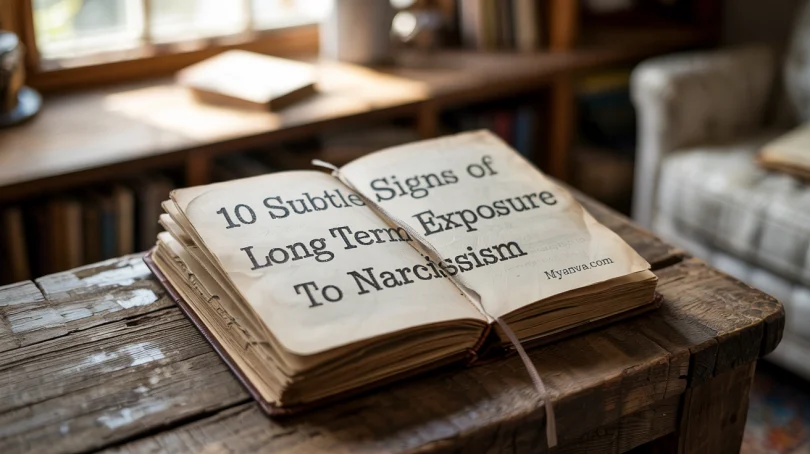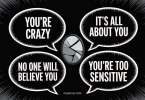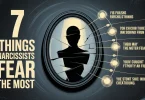Narcissistic behavior isn’t just something people experience up close and personal from a friend, a partner, or even a parent. It’s something that can affect many other people as well, whether directly or indirectly. For instance, imagine if you were to throw a stone into a pond. Well, that’s going to cause some ripples, but those ripples are going to spread out until they reach everyone who’s standing around the water’s edge. The impact of narcissistic behavior can be the same.
So, in this article, I’m going to outline 10 subtle signs that someone has been exposed to narcissistic behaviors, whether that’s in a relationship, a workplace, a cult-like movement of some kind, or even on social media. I’m going to look at long-term exposure where someone is not necessarily being abused, but they witness the behavior. They might even witness others being abused, but they’re in an environment or a situation where narcissism dominates, where maybe there’s only one narrative allowed, and there’s no room for critical thinking or autonomy.
Sign 1: Overexplaining Themselves
The first sign of long-term exposure to narcissistic behavior could be someone overexplaining themselves. Narcissists tend to be very critical and judgmental of others, and this can lead people to become defensive. Now, even if someone isn’t directly affected, they might see how others are being treated, and this can lead them to preempt some kind of attack.
So, even if they’re not in the company of that narcissistic person, whenever they’re explaining something, they might sound as if they’re excusing something or pleading. They might sound as if they’re trying to justify things, maybe even go into a lot of unnecessary detail.
Related Topics:
The non-charismatic narcissist
8 Demonic Ways Narcissists Mess with Your Mind
7 Signs a Narcissist Is Done With You
7 Subtle Tricks Covert Narcissists Use to Control You
5 SIGNS a Narcissist Doesn’t Just HATE You
Sign 2: Making Excuses for Things They’re Not Responsible For
This leads me to sign number two, which is another aspect of being defensive, and that’s when they try to think of reasons, excuses, justifications, or apologies for things they’re not responsible for, but things they fear they may be blamed for. They might even be reluctant to mention, or even apologize for mentioning, someone else’s errors. They fear the reaction. In other words, they have learned to keep quiet.
Sign 3: Fear of Making Mistakes
Sign number three: Having been in long-term contact with narcissists, someone might develop a fear of making mistakes. In extreme cases, they might begin to panic if they do. Narcissistic people often demand perfection, often claiming they have high standards standards they generally don’t even hold themselves to. But long-term exposure to these kinds of expectations can have someone fearing the backlash, the harsh judgment, the humiliation if they do mess up in any way.
Now, in a work environment, what can happen is the more someone fears making mistakes, the less likely they’re able to concentrate on what they’re actually doing, and they end up making mistakes. On social media, there can be a fear of saying the wrong thing or maybe liking the wrong person’s post for fear of backlash.
Sign 4: Indecisiveness
Sign number four is indecisiveness. If faced with a choice, it’s not that someone might want to make the right decision; they just fear making the wrong one, even over something that’s not that big a deal. Narcissists like to dominate and control. They like you to ask for their permission for things, and they’ll always give an opinion; it’s just rarely a positive one.
Now, even outside the influence of that narcissist, someone might try to seek reassurance by asking others what they think they should do, and what they think the right decision would be. They find it hard to trust themselves.
Sign 5: Hypervigilance and Guilt
Sign number five: Narcissistic people often lead others to believe that they’re responsible for their moods, and their behavior. Other people are responsible for everything that goes wrong; they’re even responsible for their pain. This can lead to feelings of guilt, being hypervigilant, and a heightened sensitivity. So, someone starts to become more jumpy.
They can be distrustful of others, especially those who appear loyal to the narcissist. That being said, they can also become distrustful of strangers. There can be heightened startled responses. There can also be the fear of being set up to fail, and this can lead to constant fatigue. Heightened senses can be useful in stressful situations, but only in short bursts. In the long term, it can lead to mental and physical exhaustion.
Sign 6: Feeling Controlled
Sign number six would be very common in toxic workplaces, and that is feeling controlled. Some feel they don’t have any rights; they don’t matter. Anything they want or would like for themselves is selfish. They are only there to serve. In that environment, they might feel used; sometimes, they might even feel hated if they aren’t in the narcissist’s inner circle of followers.
Now, in a cult-like movement, someone might not necessarily believe a word that’s being said to them, but they don’t challenge it out of fear of being punished or ostracized. They might know they’re being lied to or lied about, but they remain silent, and this could bring up a sense of helplessness but also a sense of shame.
It can also cause cognitive dissonance, and they might feel surprised whenever someone does treat them with decency. But, as previously mentioned, this can bring up feelings of distrust and uncertainty.
Sign 7: Keeping Things to Themselves
Sign number seven is whenever someone starts to keep things to themselves. They don’t share bad news. They’ve seen what happens to others when they share bad news others getting mocked or attacked whenever they’re in pain. Now, even something like a bereavement, which would usually elicit sympathy in others, well, having seen the lack of empathy and compassion for other people, they just remain silent. They keep their pain to themselves.
But they don’t share any good news either because they have seen others being ridiculed, scorned, or attacked, sometimes even for just having a nice weekend. So, instead, they just withdraw, and they keep to themselves. This can also lead people to hide their skills, their talents, and their experiences whenever they’re faced with problems and difficulties because the last thing they want to do is to draw attention to themselves in case the narcissist and their followers decide to target them.
And rather than take credit for anything, they might claim other people suggested the ideas or showed them how to do it. In some cases, they might only really share things that praise the narcissist or the group narrative, even if that goes against their very core.
Sign 8: Negative Self-Appraisal
This leads me to sign number eight. In a toxic situation or environment, after a lot of suppressing your voice, your skills, talents, and so on, this can lead to negative self-appraisal and negative self-talk. People might feel that the situation is as bad as it is because they don’t speak up, and yet they feel unable to because they have seen what happens to those who do. Their opinion of themselves and the situation becomes distorted, and this can bring up not just a sense of fear but a sense of helplessness.
As I mentioned earlier, this can leak into other areas. For instance, they can either be overly apologetic and compliant in other situations, or they might become overly rigid with their boundaries.
Sign 9: Accepting the Abnormal as Normal
Sign number nine is feeling a sense of defeat, that they have just come to accept something abnormal as being normal. This can lead to low mood and low energy. They lose incentive; they lose motivation and might begin to find it hard to find pleasure in the things that they used to enjoy.
Sign 10: Relief Away from the Narcissist
Lastly, sign number ten is whenever someone begins to notice that their anxiety and stress levels decrease whenever they’re not in the company of the narcissist or their followers. For instance, they might be on leave from work, they might be withdrawing from social media forums, or maybe not attending some of those group events.
Now, they might still experience the things I’ve previously mentioned, but to a lesser degree. They can relax a bit more, and be themselves, but they also notice that the anxiety, the stress, the hypervigilance increases whenever they’re back in those situations, back in the company of those narcissistic people.






